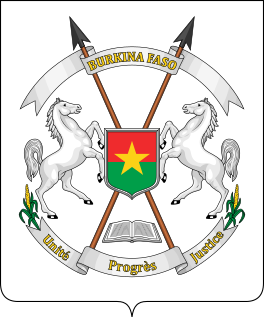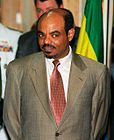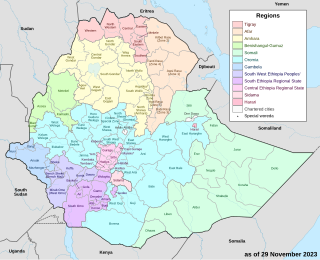
The politics of Ethiopia arise from the way the government of Ethiopia is structured as well as socioeconomic factors. The country's government is structured as a federal parliamentary republic with both a President and Prime Minister.

At the federal level, Ethiopia elects a legislature. The Federal Parliamentary Assembly has two chambers: the Council of People's Representatives with not more than 550 members as per the constitution but actually nearly 547 members, elected for five-year terms in single-seat constituencies; and the Council of the Federation with 117 members, one each from the 22 minority nationalities, and one from each professional sector of its remaining nationalities, designated by the regional councils, which may elect them themselves or through popular elections.

Parliamentary elections were held in Zimbabwe on 31 March 2005 to elect members to the Zimbabwe House of Assembly. All of the 120 elected seats in the 150-seat House of Assembly were up for election.

Ethiopia held general elections on May 15, 2005, for seats in both its national House of Peoples' Representatives and in four regional government councils. Under pressure from the international community, Prime Minister Meles Zenawi promised that this election would be proof that more democracy would come in this multi-ethnic nation; international elections observers from the European Union (EU) and the U.S.-based Carter Center were present to observe the results. This election succeeded in attracting about 90% of the registered voters to the polls. A government ban on protests was imposed throughout the election period.
The Coalition for Unity and Democracy, commonly referred to by its English abbreviation CUD, or occasionally CDU; its Amharic abbreviation, used in Ethiopia, is Qinijit, in English writing often referred to as Kinijit) is a coalition of four existing political parties of Ethiopia which combined to compete for seats in the Ethiopian General Elections held on May 15, 2005. Its leader was Dr. Hailu Shawul.
Hailu Shawul was an Ethiopian prominent politician and Civil Engineer who was the leader of the Coalition for Unity and Democracy (CUD) during Ethiopian general election, 2005. He was also the leader of All Ethiopian Unity Party from 1996 to 2013. He died at age of 80 on October 6, 2016 while receiving treatment at a hospital in Bangkok, Thailand.

The Gambela Peoples’ Democratic Movement is a political party in the Gambela Region of Ethiopia. It is the regional ally of the ruling EPRDF coalition.

General elections were held in Sierra Leone on 11 August 2007. Seven candidates competed in the first round of the presidential election; no candidate received the necessary 55% of the vote to win in the first round, and a second round was held between the top two candidates, Ernest Bai Koroma of the All People's Congress (APC) and Solomon Berewa of the Sierra Leone People's Party (SLPP), on 8 September. According to official results, Koroma won the election with 54.6% of the vote.

A presidential and parliamentary election was held on 27–28 November 2009 in Namibia. It was the fourth general election since independence and the fifth democratic election. Voting ended on 28 November and official election results, released on 4 December, showed that Hifikepunye Pohamba and his SWAPO Party were re-elected, each with over 75% of the vote. Prior to the election, the South West Africa People's Organization (SWAPO) was widely expected to score a landslide victory, with the Rally for Democracy and Progress (RDP) considered SWAPO's biggest challenger. Fourteen political parties competed for seats in the National Assembly of Namibia, and twelve candidates ran for the Presidency.

General elections were held in Ethiopia on 7 and 18 May 1995 for seats in its Council of People's Representatives; elections in the Afar, Somali, and Harari Regions were delayed until 28 June to assign experienced personnel who could solve possible conflicts and irregularities. This was the first multi-party election in Ethiopia. Several opposition parties boycotted the election, including the All-Amhara People's Organization, Council of Alternative Forces for Peace and Democracy in Ethiopia, and Ethiopian Democratic Unity Party.

Ethiopia held general elections on 14 May and 31 August 2000 for seats in both its national House of Peoples' Representatives and several regional government councils. Although several opposition parties boycotted the election, 17 parties including the All-Amhara People's Organization, the Southern Ethiopia Peoples' Democratic Coalition (SEPDC), and the Oromo National Congress did participate.

Ethiopia held nationwide elections for local offices in the kebele and woreda assemblies on 13 and 20 April 2008. By-elections were also held for seats in the Addis Ababa City Council, and in the national and regional parliaments that were vacant due to the Coalition for Unity and Democracy’s (CUD) refusal to participate at the same time. By law, the local elections were supposed to be held as part of the 2005 general elections, but due to the resulting unrest they were postponed.

Elections for a Constituent Assembly were held in Ethiopia on 5 June 1994 in order to form a body to draw up a new constitution. They were the first elections after the overthrow of the Mengistu regime at the end of the Ethiopian Civil War in 1991, and the first ever multi-party elections in the country; previous elections had either been non-partisan or one-party. The results saw the Ethiopian People's Revolutionary Democratic Front and its allies win 463 of the 544 seats. Voter turnout was 87.5%.

Parliamentary elections were held in Burkina Faso on 2 December 2012. They were the first elections held since the National Assembly dissolved the National Electoral Commission in 2011, following fraud allegations concerning the 2010 presidential elections. Municipal elections for over 18,000 councillors were held simultaneously. The elections were held amidst a period of political uncertainty, following protests against President Blaise Compaore's regime.

General elections were held in Bangladesh on 30 December 2018 to elect members of the Jatiya Sangsad. The result was a landslide victory for the Awami League led by Sheikh Hasina. The elections were marred by violence and claims of vote rigging. Opposition leader Kamal Hossain rejected the results, calling it "farcical" and demanding fresh elections to be held under a neutral government. The Bangladesh Election Commission said it would investigate reported vote-rigging allegations from "across the country." The election saw the use of electronic voting machines for the first time.

General elections were held in Cambodia on Sunday, 29 July 2018 to elect members of the sixth National Assembly. Polling stations opened at 07:00 and closed at 15:00. The number of registered voters has decreased for the first time since 1993 and was down 13% from the 2013 general elections.
Parliamentary elections were held in Ethiopia on 24 May 2015 to elect officials to the House of Peoples' Representatives. Regional Assembly elections were also held on this date.

General elections were held in Saint Vincent and the Grenadines on 9 December 2015. The result was a victory for the Unity Labour Party, which retained its one seat majority. However, the NDP has challenged the results in two constituencies, North Windward, and Central Leeward.

General elections were held in Samoa on 4 March 2016. The main contesting parties were that of incumbent Prime Minister Tuilaepa Sailele Malielegaoi, of the Human Rights Protection Party (HRPP); and the Tautua Samoa Party (TSP). The HRPP secured a landslide victory, winning 35 of the 49 elected seats in the Legislative Assembly, while 12 independents subsequently joined them, strengthening Samoa's one-party rule and preventing the TSP from obtaining the eight seats required for recognition as a parliamentary party.

Legislative elections were held in Angola on 23 August 2017, although voting was delayed until 26 August at 15 polling stations due to bad weather on election day. The top candidate of the winning party automatically becomes President after the election in accordance with the new 2010 Constitution. The ruling party MPLA headed by João Lourenço was widely expected to win. Preliminary results show that MPLA has won with a clear margin. The final results were released on 6 September 2017.
















